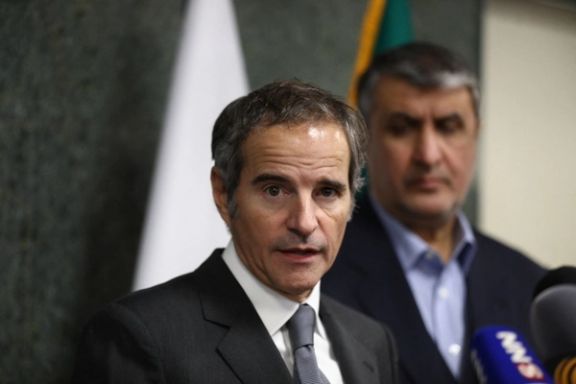Iran Doubles Down On Dropping Nuclear Probe

Iran’s nuclear energy chief said Wednesday Tehran expected the International Atomic Energy Agency (IAEA) to end its enquiries into unexplained uranium traces.

Iran’s nuclear energy chief said Wednesday Tehran expected the International Atomic Energy Agency (IAEA) to end its enquiries into unexplained uranium traces.
Mohammad Eslami, head of the Atomic Energy Organization of Iran, was reiterating an existing stance, but his comments came after a senior United States official told Reuters Monday that Iran had dropped a demand that the IAEA shelve its investigation as part of reviving the 2015 Iran nuclear deal, the JCPOA (Joint Comprehensive Plan of Action).
“We don’t expect the director general of the agency [Raphael Mariano Grossi] to utter sentences that are wanted by the Zionist regime,” Eslami told Fars News. “We have sent our written protest through our permanent representative in the agency [Iran’s ambassador to United Nations organizations based in Vienna]. Whatever has transpired in these negotiations is aimed at ending these claims before carrying out JCPOA commitments.”
With Iran’s 16-month talks with world powers at a delicate stage, Iran has cited a December 2015 precedent when the agency published a ‘final’ report on its pre-2003 nuclear work. Tehran says the agency’s further enquiries into this work, which led to inspectors finding uranium traces, came only after then Israeli prime minister Benjamin Netanyahu in 2018 made allegations based on documents he said were removed by Israeli intelligence from Iran.
Grossi – backed by France, Germany, the United Kingdom, and the United States – has argued that, regardless what happens over the JCPOA, Iran must satisfy the IAEA over these uranium traces purely as part of its ‘safeguards’ commitments under the Nuclear Non-Proliferation Treaty.
Grossi ‘hopeful’ on ‘filling in gaps’
In an interview with NPR Tuesday, Grossi said he was “hopeful” Iran would explain the presence of the uranium. “They know they have to do it, we have agreed on a mechanism,” he said. “My legal obligation is to ask the question.”
Grossi said it was a “political question” as to whether adequate explanations were needed before there could be agreement on reviving the JCPOA. The IAEA chief stressed the need for “maximum levels of access and inspection,” which Iran has restricted since 2020 following the US withdrawal in 2018 from the JCPOA. Under the JCPOA, Iran was required to accept more intrusive inspections, including implementation of the ‘additional protocol.’
“If the IAEA is allowed to do our inspection work, we are going to get there – I’m pretty confident,” Grossi said. The director general noted the IAEA had lost “continuity of knowledge” when Iran in June removed 27 cameras from nuclear manufacturing sites and storage facilities that had been installed after the JCPOA.
“If and when the agreement is revived and we can reconnect the cameras, we’ll have to sit down with our Iranian colleagues and see how we can fill in the gaps,” Grossi said. “If we have the correct access, the inspectors of the IAEA will always be in a position to detect in a timely manner any deviation of nuclear material…”
Associated Press reported Wednesday that the US would later today respond, presumably through the European Union, to an Iranian response made August 15 to EU proposals circulated August 8 to bridge remaining gaps over restoring the JCPOA.
While contents of the EU-mediated exchanges have been confidential, claims and reports have emerged over various stumbling blocks. As well as the IAEA probe, these include Iran’s demand for nuclear and economic ‘guarantees’ should the US again leave the JCPOA.